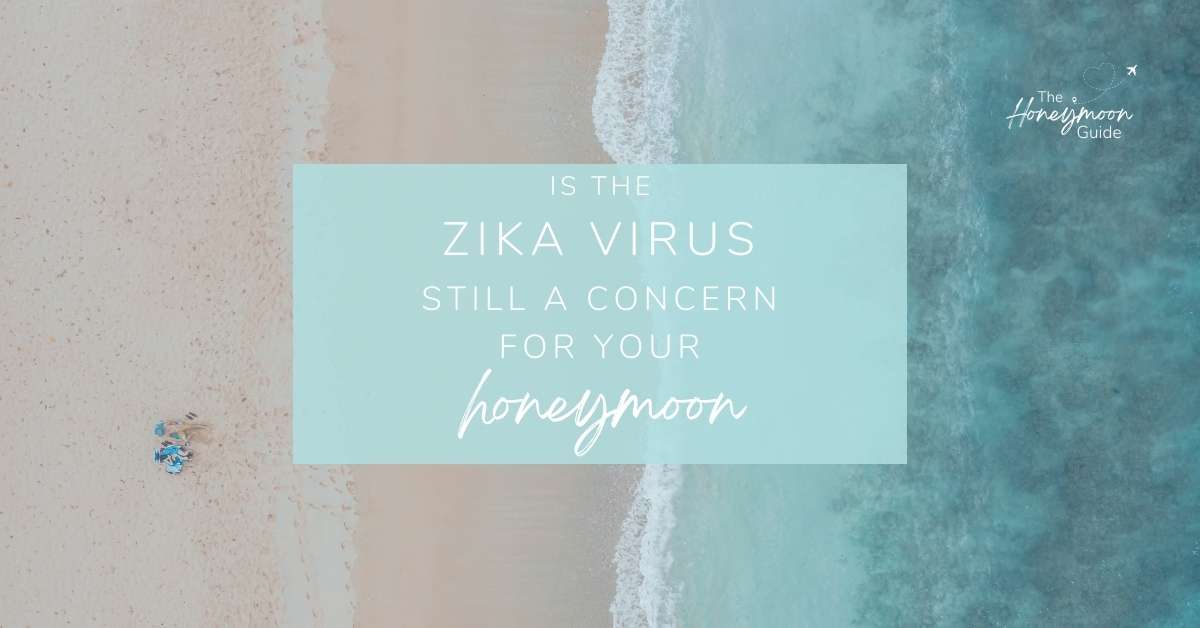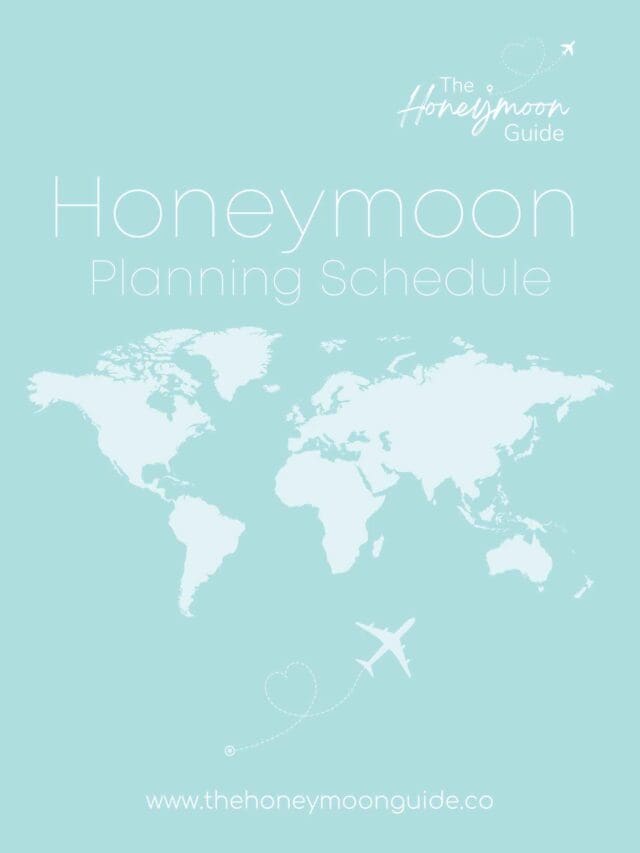Is The Zika Virus Still a Concern For Your Honeymoon?
The Zika virus may not be all over the media right now, but it is something honeymooners should be aware of! We have the lowdown, including Zika free destinations.

So we guess you were browsing some magical honeymoon destinations and starting to plan your honeymoon and someone mentioned about the Zika virus and you’re wondering how this affects you.
Or maybe you already know about it and you’re wondering is Zika still a thing? Suddenly, you’re in a whirlpool of questions about it – whether the Zika virus affects you and if you should choose Zika free honeymoon destinations?
Well, you’re not alone, and you’ve come to the right place!
The Zika virus came to prominence around the time of the Rio Olympics in 2016 as reports of pregnant women in Brazil tragically giving birth to babies with birth defects because of an outbreak of the virus. The WHO advised women who were pregnant, or planning to get pregnant, not to visit countries where contracting the Zika virus was a risk.
This meant that, for some couples, many dream honeymoon destinations around the world were out of the question. Since the Covid-19 pandemic began in late 2019, Zika has had little prominence in the media. However, the Zika virus is still something you should have all the information about.
If you’re wondering, does the Zika virus affect my honeymoon? Is the Maldives Zika free? Is Hawaii Zika free? Where are the best tropical destinations without Zika? Where can I find beaches without Zika? Is there a Zika virus vaccine?
Read on for all you need to know about Zika virus and planning a honeymoon, including the best zika free honeymoon destinations!
Disclaimer: We’ve done our homework, but it is essential to get medical advice from a registered medical practitioner or health care provider in your home country.
For up-to-date information regarding the Zika virus, please visit the United States Centers for Disease Control (CDC) website, which we have found to have the most relevant and updated information.
You can also check your own country’s medical advice (although they may not have been updated recently because of the pandemic) – here are links to European Union | Ireland | United Kingdom | Australia | Canada.
We use affiliate links on our platform. If you click and book or buy through them, we may earn a small commission – at no extra cost to you. This helps keep the lights on at Honeymoon HQ! Rest assured, our recommendations are impartial and independent; we only suggest what we love and think you’ll love too! See our full disclaimer on our policies page.
What is the Zika Virus?
The WHO states that the Zika virus disease is caused by a virus transmitted primarily by Aedes mosquitoes, which bite during the day. Symptoms are usually mild and include fever, rash, conjunctivitis, muscle and joint pain, malaise or headache.
Symptoms typically last for 2–7 days. Most adults with Zika virus infection do not develop symptoms or suffer from long-term health implications.

Why does Zika virus matter if you’re planning a honeymoon?
While couples may not be planning to start a family immediately after getting married/going on honeymoon (or not planning to start a family at all), it’s important to be aware of the risks for women who are pregnant, planning to get pregnant or where there is the prospect of an unplanned pregnancy.
People can contract the virus from a bite from the Aedes mosquito but the virus can also be sexually transmitted (even if neither of you has symptoms) which is then passed from mother to foetus.
With Zika virus exposure, there is a risk of birth defects, including microcephaly and other congenital abnormalities.
In addition, several countries, including Brazil, reported a steep increase in Guillain-Barré syndrome – a neurological disorder that could lead to paralysis and death.
There is currently no vaccine on the market for Zika Virus. However, trials of a vaccine have begun The University of Liverpool.
Travelling to areas with Zika Virus
The only way to prevent a Zika infection during pregnancy and to prevent complications caused by the Zika virus is to not travel to areas with a risk of Zika and to use precautions or avoid sex if your partner has travelled to a risk area.
If you are not planning to start a family immediately after your wedding or on your honeymoon, then there is no reason you can’t go to a destination where Zika is a risk (as long as you take precautions not to get pregnant).
If you are travelling to a honeymoon destination where there is a risk of contracting the Zika virus, you should wait at least 3 months from your return before trying to conceive.
If you want to conceive within three months of travelling on your honeymoon, speak to your healthcare professional about getting tested for the Zika virus on your return.
Couples who are embarking on assisted reproduction such as IVF should avoid Zika areas. It’s essential to chat with your doctor about this.

Zika Free Honeymoon Destinations
It’s important to note that while the Aedes mosquito can’t travel far by itself, humans can introduce it to a destination in other ways, such as transport.
Things can change quickly, so while a destination may be zika free now, it could change tomorrow.
The Maldives had one case in 2016, but it is considered a Zika risk area.
The EU reported its first case ever of Zika in 2019 (one case in southern France).
However, the mosquito has become more prevalent, and the media reported in September 2023 that Paris had to be fumigated for the tiger mosquito which is present in the city because of changes in the climate. These mosquitos are part of the Aedes family.
According to the WHO, the overall risk of is Zika in Europe is considered low to moderate.
It’s important to check the CDC website or WHO website if choosing a zika free honeymoon destination is important to you. This CDC map is very useful.
You’ll see that most of Central & South America, the Caribbean and South East Asia are not recommended because of previous outbreaks, for example. As we update this blog (December 2024), there are currently no major outbreaks of the virus, but please proceed with caution.
If are eager to start a family, if you can wait a few months until after your wedding and honeymoon, then the world is your oyster. The Zika virus is something you don’t need to be concerned about!
If, however, you decide you can’t wait, there are some exciting and romantic destinations you can consider for a zika free honeymoon*. Let’s take you to all the Zika free countries for 2025:
*The destinations mentioned below have either no mosquitos or they have mosquitos but have never reported a Zika case at the time of writing.
Dreaming of turquoise waters and powdery white sands? Indian Ocean paradises, Mauritius & Seychelles, are wonderful destinations if you’re looking for a tropical beach honeymoon.
Mauritius is ideal for a relaxing beach honeymoon vacation – discover the best Mauritius honeymoon hotels and things to do in Mauritius.
Want to island-hop in paradise? There are so many things to do in in Seychelles and don’t miss the beautiful Seychelles resorts.
Discover the differences between Mauritius and Seychelles.
The Americas, including Central & South America (except for Chile), the Caribbean and the USA, have had previous outbreaks of Zika, including as far north as Texas and Florida however, most parts of the United States of America are Zika free.
Consider a California road trip from San Francisco to San Diego with a hop over to Las Vegas. Stay in one of the iconic hotels and take a trip to the Grand Canyon.
Maybe island hopping in Hawaii is up your street? Discover everything you need to know about this heavenly island state.
Canada is also a great option for a romantic and majestic honeymoon road trip and a great jump-off point to cruise around Alaska.
Australia is also one of our favourite honeymoon destinations. For a first-time visit drive from Cairns down to Sydney – so much fun along the way. Take the Ghan train, one of the world’s most romantic train journeys. Or, consider New Zealand for an epic road trip of a lifetime.
Thinking about a safari honeymoon? South Africa has spectacular wildlife experiences and a lot more, from bungee jumping to luxury wine tours.
Get off the beaten track with a road trip in Namibia.
Explore Petra in Jordan. Witness the arid landscapes of the gulf. Oman has many cultural and scenic highlights, and the world’s most opulent, luxurious hotels, including spectacular desert hotels.
Maybe wonderful rooftop pools are more up your street? You’ll find them in Dubai and the rest of the United Arab Emirates with so much to see and do.
Island-hopping in Greece’s Cyclades islands is one of our favourite Europe honeymoon recommendations. Stunning islands like Santorini and Mykonos are ideal for a romantic honeymoon with some stunning hotels.
Travel around Italy’s stunning Amalfi Coast, explore Tuscany, Puglia or tour around Lake Como and Lake Garda. The hardest part is picking which of the incredible destinations you should add to your itinerary.
Because of the cooler climate, Northern Europe is free from tropical diseases. Consider a road trip in Iceland. Cruise around the Norway’s stunning Fjords, ideal for lovers of the great outdoors.
Visit the Baltic capitals like Copenhagen and Stockholm. The ancient cities and wild coastlines of Ireland, Scotland, England & Wales are perfect for a road-trip with a difference.
Let’s cover some destinations we get asked about the most with our quick fire FAQ!
Is Maldives zika free?
The Maldives has had one reported case of zika previously. The Maldives is not considered a zika-free destination because of this previously reported case.
Is Bali zika free?
There have been zika outbreaks in Bali and the rest of Indonesia previously. Indonesia is not considered a zika free destination.
Is Thailand zika free?
There have been zika outbreaks in Thailand previously. Thailand is not considered a zika free destination.
Is Hawaii zika free?
There have been no known locally transmitted cases of Zika in Hawaii. Therefore, it is considered a zika free destination.
Is the Caribbean zika free?
Caribbean island nations have had previous cases of Zika virus and while you will read elsewhere that some islands are zika free, where there has been a previous case of zika, there could still be an outbreak or risk.
Is Mauritius zika free?
There have been no known locally transmitted cases of Zika in Mauritius. Therefore, it is considered a zika free destination. According to the CDC, mosquitoes that spread Zika are not present in Mauritius.
Is Seychelles zika free?
There have been no known locally transmitted cases of Zika in Seychelles. Therefore, it is considered a zika free destination. According to the CDC, mosquitoes that spread Zika are not present in Seychelles.
Is Dubai zika free?
There have been no known locally transmitted cases of Zika in Dubai or the United Arab Emirates. Therefore, it is considered a zika free destination. According to the CDC, mosquitoes that spread Zika are not present in Dubai or the UAE.

How to prevent mosquito bites on honeymoon
Mosquitos are part of life when travelling to warmer climates. While the Zika virus is a very serious consideration for people who want to have a baby, there are other serious mosquito-borne diseases such as malaria or dengue fever, so it’s important to discuss tropical disease prevention with a medical professional.
Here at The Honeymoon Guide, mozzies love us! Thankfully, we’ve never been sick, but we have been in agony with bites.
We’ve tried everything – many lotions and potions. What works for one person doesn’t work for another, so it can be confusing.
Some say take Vitamin B12, others swear by citronella candles, others say science backs none of these up! However, everything is worth trying, so here are some practical things you can do to prevent mosquito bites on your honeymoon:
- Consider longer sleeves and trouser/skirt lengths and loose-fitting clothing.
- Use good quality insect repellent with DEET.
- Bring a mosquito net if not staying in an air conditioned room.
- Avoid being around stagnant water (i.e. buckets, plant pots)
- Stay near a fan and keep your room air-conditioned.
- Avon Skin-So-Soft Dry Oil is a miracle (we mix it with a little DEET).
- Lemon Eucalyptus and Citronella Oil candles
- Insect repellent bracelets (which can be worn as anklets, too).
- If you get bitten, have a Beurer BR60 or a Bite Away pen to quickly relieve pain and itching.
We hope this article is useful. Is Zika virus a consideration while you plan your honeymoon? Got any mosquito-fighting secrets? Join the chat and let us know!
Happy Planning x
Related honeymoon articles:
Honeymoon Planning resources
Pin for later ✈️🤍









